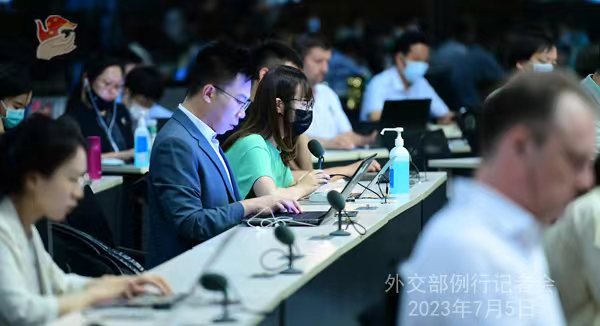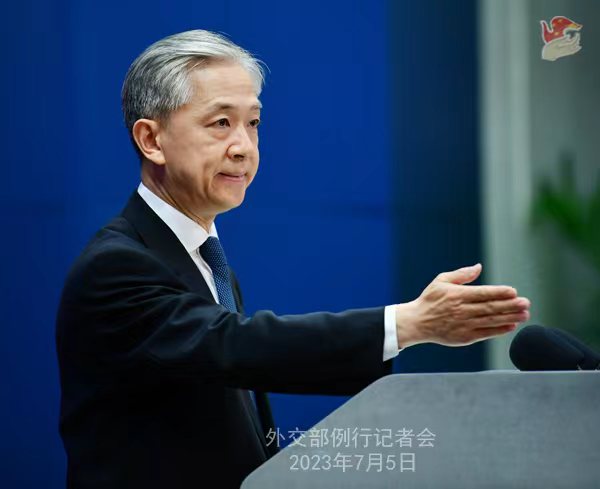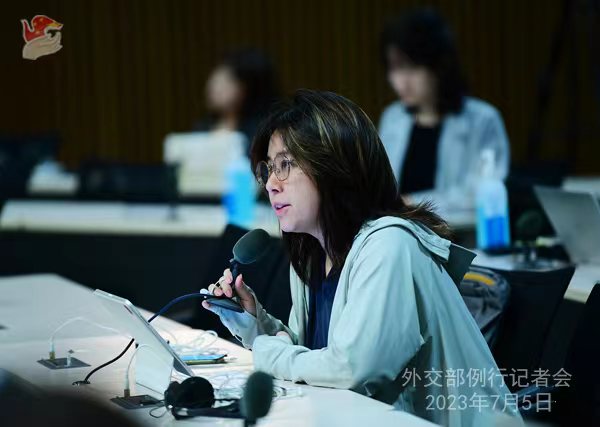| Foreign Ministry Spokesperson Wang Wenbin’s Regular Press Conference on July 5, 2023 |
| 2023-07-05 20:56 |
|
Xinhua News Agency: It was reported that China has canceled the visit to China by High Representative of the European Union for Foreign Affairs and Security Policy Josep Borrell previously scheduled for next week. Do you have any comment? Wang Wenbin: China attaches high importance to relations with the EU and maintains exchanges with the EU at all levels in various fields. We welcome High Representative Josep Borrell to visit China at an early date of mutual convenience. We will continue to stay in contact with the EU side. CGTN: The International Atomic Energy Agency (IAEA) yesterday released a Comprehensive Report on the disposal of nuclear-contaminated water at the Fukushima Daiichi Nuclear Power Station, which attracted wide attention from the international community. According to reports, the Japanese government plans to start the ocean discharge process as early as this August. People from many countries protested and expressed opposition. Chinese departments made statements on this. Does the foreign ministry have any further comment? Wang Wenbin: On the report released by the IAEA yesterday, the Ministry of Foreign Affairs of China, China Atomic Energy Authority and the National Nuclear Safety Administration have made clear China’s strong position. China’s position is based on science and facts. I would like to stress again that the report should not be the “shield” or “greenlight” for Japan’s discharge of nuclear-contaminated water into the ocean. First, the report cannot justify Japan’s plan of discharging nuclear-contaminated water into the ocean. The Japanese side unilaterally decided to dump the water into the ocean, which is in fact minimizing its own costs and risks while letting the world take nuclear contamination risks that could have been avoided. The report clearly pointed out that the IAEA provides neither a recommendation nor an endorsement of Japan’s ocean discharge plan. Second, the report cannot give legitimacy to Japan’s plan of discharging nuclear-contaminated water into the ocean. By discharging nuclear-contaminated water into the Pacific Ocean, the Japanese side may violate obligations stipulated in international law, including the United Nations Convention on the Law of the Sea (UNCLOS) and the Convention on the Prevention of Marine Pollution by Dumping of Wastes and Other Matter in 1972. Since Japan claims that it abides by international law and rules, it owes the international community an explanation. Third, the report cannot ensure the safety of Japan’s plan of discharging nuclear-contaminated water into the ocean. The effectiveness and long-term reliability of Japan’s purification facility is not verified by a third party, the authenticity and accuracy of the nuclear-contaminated water data lacks proof and the long-term influence of radionuclides in the nuclear-contaminated water on food safety and people’s health through biological concentration has not been studied. Fourth, the report cannot ensure the effectiveness of the monitoring arrangement. TEPCO has tampered with or held back nuclear-contaminated water data for many times. In the IAEA’s plan, the monitoring arrangement does not include independent sampling and takes TEPCO’s data and information as the basis of monitoring. Such practice is inadvisable. Facts have shown that the report did not resolve the strong opposition to ocean discharge both in Japan and the rest of the world. According to a latest survey in Japan, 40 percent of Japanese oppose ocean discharge. According to a joint survey by the ROK’s Hankook Ilbo and Japan’s Yomiuri Shimbun newspapers, over 80 percent of ROK respondents disapprove of Japan’s discharge of nuclear-contaminated water into the ocean. Experts and people in the Pacific Island countries, the Philippines, Indonesia, South Africa, Peru and other countries protested and voiced their opposition. The Chinese people have strong concerns over Japan’s discharge plan. Competent departments of the Chinese government will enhance marine environment monitoring and strengthen inspection and quarantine of imported seafood and other products to safeguard people’s health and food safety. Japan’s planned ocean discharge of the nuclear-contaminated water bears on major international public interest. The stakes are too high. We cannot afford to ignore risks that might lead to a mishap. We urge Japan to respect science and facts, not attempt to use the IAEA report to shield its ocean discharge, faithfully fulfill its moral responsibility and obligations under international law, stop pushing forward the ocean discharge plan, and dispose of the nuclear-contaminated water in a responsible manner. AFP: Just to follow up on the Fukushima waste water plan, what concrete measures does China plan to take if Japan goes ahead with the plan? Wang Wenbin: Our opposition to Japan’s forcibly pushing through the ocean discharge plan is consistent and clear. We once again urge the Japanese side to respect science and facts, faithfully fulfill its international moral responsibility and obligations under international law, stop pushing through the ocean discharge plan, and dispose of the nuclear-contaminated water in a responsible manner. Yonhap News Agency: China has released a readout about the consultation between ROK and Chinese diplomats in Beijing on July 4, during which they agreed to enhance high-level communication. It is expected that ROK and Chinese foreign ministers may hold talks during next week’s ASEAN Regional Forum. What is your comment? Wang Wenbin: On July 4, Vice Foreign Minister Sun Weidong held consultation with visiting Deputy Foreign Minister of the ROK Choi Young-sam. China has released a readout, which you may refer to. Both China and the ROK believe that the consultation is constructive. The two sides agreed to work together to overcome the current difficulties in bilateral relations and bring the relations back to the track of sound development. The two sides also agreed to enhance political and diplomatic communication. As for your specific question on the bilateral meeting between the foreign ministers of the two countries during the ASEAN-plus foreign ministers’ meetings, I have nothing to share at the moment.
CCTV: Yesterday, President Xi Jinping attended the Shanghai Cooperation Organization (SCO) summit in Beijing via video link and delivered an important speech. What are the important outcomes of the summit? What is the major influence of President Xi Jinping’s important speech on the development of the SCO? Wang Wenbin: The 23rd Meeting of the Council of Heads of State of the Shanghai Cooperation Organization (SCO) was held via video link on July 4. President Xi Jinping attended the summit in Beijing and delivered an important speech entitled “Staying True to Our Founding Mission and Advancing Unity and Coordination to Realize Greater Development”. At the meeting, President Xi Jinping had an in-depth exchange of views with leaders of participating countries on the future development of the SCO and major international and regional issues, reaching a series of consensus and achieving major outcomes. All sides in the summit declaration reaffirmed the shared position of upholding multilateralism, international fairness and justice and the vision of fostering a new type of international relations and building a community with a shared future for mankind. It was pointed out that all sides will firmly combat terrorism, separatism and extremism and carry out cooperation in such areas as protecting information security, combating drug-related crimes, preventing weaponization of outer space, enhancing the nuclear nonproliferation regime and advancing international arms control, disarmament and non-proliferation. The summit adopted the SCO Economic Development Strategy for the period until 2030, providing a specific plan for deepening cooperation in the next phase in trade and investment, connectivity, scientific and technological innovation, energy, agriculture and other areas. Leaders of participating countries proposed a series of important initiatives in carrying out cooperation in such areas as science and technology, education, culture, health, sports and tourism. Facing questions raised by our times—unity or split, peace or conflict, cooperation or confrontation, President Xi Jinping has keen observation of the trend of the world and stands at the strategic height of long-term development of humanity with a global vision and people-centered philosophy. In his speech at the summit, President Xi gave an unequivocal answer: “the people’s wish for a happy life is our goal, and peace, development and win-win cooperation are the unstoppable trends of the times.” It was warmly echoed and commended by the international community. In his speech, President Xi Jinping fully recognized the SCO’s successful practice in actively building a community with a shared future for mankind in the past decade and made it clear that the SCO should keep in mind our founding mission, and stay in unity and coordination to bring more certainty and positive energy to world peace and development. To this end, President Xi Jinping made five important cooperation proposals: First, we should keep to the right direction and enhance solidarity and mutual trust. President Xi Jinping stressed that we should step up strategic communication and coordination, truly respect each other’s core interests and major concerns, be highly vigilant against external attempts to foment a new Cold War or camp-based confrontation in our region and make sure that the future of our development must be held firmly in our own hands. Second, we should maintain regional peace and safeguard common security. President Xi Jinping called on all sides to work together to implement the Global Security Initiative, upgrade SCO security cooperation, move faster to strengthen the mechanisms for our law enforcement and security cooperation, expand cooperation in the nontraditional security fields, so as to forge a solid security shield in our region. Third, we should focus on practical cooperation and expedite economic recovery. President Xi Jinping called on all sides to work together to implement the Global Development Initiative, enhance the synergy between high-quality Belt and Road cooperation and development strategies of various countries and regional cooperation initiatives, make full use of existing mechanisms and platforms for practical cooperation in various areas, further promote trade and investment liberalization and facilitation, ensure stable and smooth functioning of regional industrial and supply chains and facilitate high-quality development of SCO economies. Fourth, we should strengthen exchanges and mutual learning and forge closer bonds between our peoples. President Xi Jinping expressed welcome for all sides to work together to implement the Global Civilization Initiative. He also announced that in the coming three years, China will provide SCO member states with 1,000 International Chinese Language Teachers Scholarships, offer 3,000 “Chinese Bridge” summer camp opportunities, and invite 100 young scientists to China for scientific research exchanges. China will also host events on rural revitalization and climate response. Fifth, we should practice multilateralism and improve global governance. President Xi Jinping suggested that all sides should advocate the common values of humanity, uphold the UN-centered international system and the international order based on international law, and make global governance more just and equitable. President Xi Jinping’s important statement has been warmly received and all sides attending the meeting have agreed that we should stay true to our founding mission, further tap into the potential for cooperation, fully expand and deepen cooperation, and ensure that the outcomes of cooperation will bring more benefits to the people. We are convinced that the SCO members will act in line with the trend of the times, work together in good faith and forge ahead to realize the aspirations of our people for a better life and jointly inject strong impetus into the efforts to uphold world peace and development.
Global Times: It was reported that the first group of Honduran students left Taiwan and arrived in the Chinese mainland on July 4 for their new life of studying. What is your comment? Wang Wenbin: After China and Honduras established diplomatic relations, China pledged its readiness to accept all Honduran students in the Taiwan region. Over the past three months or so since then, the two sides have worked together with great efficiency to coordinate the matter. Yesterday, the first group of 26 Honduran students left Taiwan and arrived in Beijing, Tianjin, Xi’an and other mainland cities to continue their studies. We extend our warmest welcome to them. The Honduran students are looking eagerly forward to studying in the Chinese mainland, where they will make full use of the curriculum on campus, get steeped in the Chinese culture, and contribute to the development and progress of their home country as well as friendly exchanges between Honduras and China. We welcome more Honduran students to China’s mainland to pursue their education and stand ready to work together with the Honduran side to expand people-to-people exchange and cooperation and build a bridge of friendship to bring our two peoples closer. China News Service: It was reported that the US State Department released the After Action Review on Afghanistan a few days ago, reflecting on the insufficient preparations for crisis management and chaos during the US government’s withdrawal of troops from Afghanistan in 2021. Do you have any comment? Wang Wenbin: We noted the report released by the US. Regrettably, issues that truly call for review and reflection of the US were not touched upon in the report. These include the use of force against a sovereign country in violation of international law, interference in other country’s internal affairs under the pretext of democracy, the selective counter-terrorism campaign which led to more rampant terrorist activities, huge casualties of innocent civilians, and harm to peace and stability in the region. If the US’s review was only meant to make the next “Kabul moment” more orderly and presentable, it would not serve as a responsible explanation to the world. What the US really needs to do is return the Afghan central bank assets to the Afghan people, lift unilateral sanctions against Afghanistan, fundamentally abandon the policy of abuse of force and correct its acts of blatantly invading other countries and interfering in their internal affairs, and avoid a repeat of the tragedy of Afghanistan. AFP: A Chinese figure said that export controls on gallium and germanium are only the beginning of China’s countermeasures. He said if high-tech restrictions on China continue to escalate, China’s countermeasures will also further escalate. Can you tell us what other measures China plans to take? Wang Wenbin: I am not aware of relevant person’s remarks you mentioned. The Ministry of Commerce of China issued a notice on imposing export restrictions on industrial products and materials containing gallium and germanium recently, and my colleague answered a similar question yesterday, which you may refer to. I would like to reiterate that industrial products and materials containing gallium and germanium apparently can be used for both military and civilian purposes. It is international customary practice to impose export control over industrial products and materials containing gallium and germanium and EU members have also imposed export control over relevant products and materials. The Chinese government adopted relevant export control in accordance with law to make sure these products and materials are used for legal purposes and the export control does not target any specific country. Bloomberg: China has been calling on nations to spurn decoupling and the cutting of supply chains, but recently China imposed limits on exports of the two metals you just talked about. This would appear to be a contradiction. So how does China call for avoiding cutting supply chains on the one hand and then on the other cut the supply chains for these two metals? Wang Wenbin: I don’t see any contradiction here. As a responsible major country, China always advocates and champions true multilateralism, stays committed to keeping global industrial and supply chains secure and stable, and applies fair, reasonable and non-discriminatory export control measures. We oppose the overstretch of national security concept and abuse of export control by a handful of countries and bullying practices of going all out to suppress and contain specific countries. Drawing on common international practice, China has enforced export control on items related to gallium and germanium. This is completely legitimate and justified.
|
 | ||||||||||||
 | ||||||||||||
|



